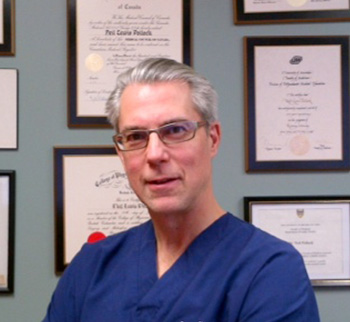VANCOUVER — In Dr. Neil Pollock’s surgery, the crown jewels are the sole focus. The Vancouver Jewish physician has never wavered from his concentration on circumcision and his efforts to hone his techniques so that they are less invasive, less painful and more widespread.
Next month, Pollock will head to Port-au-Prince where he’ll teach his circumcision technique to two Haitian doctors. His goal is that once under his supervision, and they’ve performed his circumcision technique on 200 infants age two months and younger, they’ll be able to continue to do so on other infants after he’s returned to Canada. Ideally, they’ll also serve as training physicians for others in Haiti, and will bring his technique to other countries in the Caribbean, too.
Studies have shown that among circumcised, heterosexual men the rates of HIV infection are up to 60 per cent less than in heterosexual men who’ve not been circumcised. They are also less likely to contract penile cancer and sexually transmitted diseases like human papillomavirus, syphilis and herpes. HIV-AIDS has become the single largest cause of death among Haitians under age 44, according to data from UNICEF. It’s why Pollock was recruited to Haiti in a surgical mission initiated by the Haitian government and Dr. Jeffrey Klausner, professor of medicine at University of California, Los Angeles.
To optimize the benefits of his trip to Haiti, Pollock realized he’d have to fundraise $25,000 to pay for flights, surgical equipment and supplies to use while he was there, as well as others he could leave behind. “I want to supply the doctors I train with enough resources to carry them until funding kicks in from their government,” he says. “So I sent an email out to 50 friends and family, telling them what I was doing, and within a few days I had commitments for the full amount. It felt like there was divine intervention that gave us exactly what I needed to carry this out.”
Pollock has performed more than 35,000 circumcisions in his surgical career, the majority of them in Vancouver where his clinics are located and where he doubles as a mohel. In 2008, he joined a medical team to perform a similar mission in Rwanda’s King Faisal Hospital. Here, he instructed two local doctors how to perform his 30-second circumcision technique, one that he says is “virtually painless and virtually bloodless.”
Though the focus of his Port-au-Prince teaching trip will be on infant circumcision, Pollock says he’s evolved his technique so that it’s applicable not just to newborns but to older infants, children, teens and adults, too. This one occurs under local anesthetic and without the use of sutures.
“I use a cyancrylate skin glue to close the wound in a procedure that provides for a simpler, easier, quicker, safer and improved cosmetic outcome for patients,” he says.
The healing time for older patients is a week and the organ’s cosmetic outcome is improved by the absence of suture track marks.
Over the past two decades there’s been significant debate on the medical benefits of infant circumcision and whether or not they outweigh the risks involved in the procedure. In 2012, however, the American Academy of Pediatrics released its strongest statement of support for circumcision ever, affirming that medical benefits do, indeed outweigh risks – but that the final decision regarding circumcision should rest in parents’ hands. “The Canadian society will release a paper on the subject shortly but we expect it will say the same thing, as they’re analyzing the same research studies,” Pollock says.
His trip was initially intended for May 2014 but was postponed when one of the physicians he was supposed to train was incapacitated by the chikungunya virus, which is spread by mosquitoes. As he braces himself for 12-to-14-hour work days in Haiti, Pollock is well aware of the potential risks this trip carries, between malaria, chikungunya infection and physical safety concerns in a country ravaged by poverty. “I’m going to try and survive there,” he admitted. “I’ll be wearing mosquito-repelling clothing, bringing food bars from home and sleeping under netting in my hotel room. But I’m going because this trip is an incredible opportunity to make a difference in the world and save thousands of lives.”
